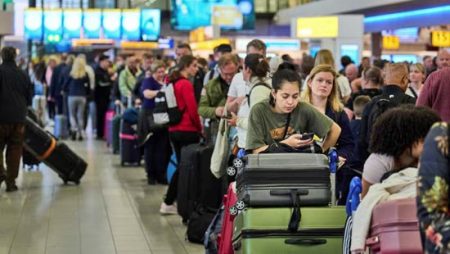Shutdown Strains Holiday Air Travel
Asheville travelers advised to brace for delays.

As millions of Americans prepare to travel for the holidays, Asheville Regional Airport is among many nationwide bracing for ripple effects from the federal government shutdown.
The shutdown has forced thousands of Federal Aviation Administration (FAA) employees—including air traffic controllers—to continue working without pay. FAA officials warn that staff shortages are spreading through key regional control centers, slowing flight operations at major hubs and creating a domino effect that could delay regional flights in and out of Asheville.
“We’re reaching a tipping point,” Transportation Secretary Sean Duffy said. The system is strained, and we’re seeing the impact across the country.”
Airport officials at AVL are already sounding the alarm. “We remain committed to providing safe and reliable service for our region’s travelers,” said a spokesperson for AVL. “But we strongly recommend passengers allow extra time and check for flight updates regularly, especially during this busy holiday period.”
National and International Impact
Major airports already reporting significant slowdowns include Atlanta Hartsfield-Jackson, Charlotte Douglas International, Chicago O’Hare, Dallas/Fort Worth International, New York’s JFK, and LaGuardia, Newark, Los Angeles International, San Francisco International, Miami International, Denver International, and Washington, DC’s Reagan National and Dulles International.
Internationally, airports such as London Heathrow, Toronto Pearson, and Frankfurt Airport are also feeling the effects, as delayed US departures ripple through global flight schedules.
Union representatives for the National Air Traffic Controllers Association say fatigue and morale are worsening among controllers working without pay. “Controllers are dedicated to public safety,” one representative said, “but this level of stress is unsustainable.”
For travelers departing from Asheville Regional, officials recommend arriving early, monitoring flight updates closely, and allowing extra time between connections—especially for routes that pass through Charlotte or Atlanta, which handle most of Asheville’s connecting flights.
FAA leaders insist that air travel remains safe, but they acknowledge the growing strain on workers. “Controllers remain committed to keeping the skies safe,” an FAA spokesperson said, “but prolonged uncertainty makes that commitment increasingly difficult to sustain.”
With one of the busiest travel seasons of the year underway, western North Carolina travelers are being urged to pack patience along with their luggage.
What Travelers Can Do
Tips for Asheville and US flyers.
Arrive early: Expect longer security lines and potential gate changes.
Check flight status often: Use airline apps or airport websites for live updates.
Plan for flexible connections: Allow at least two hours for domestic transfers.
Travel light: If possible, use carry-on luggage only to avoid baggage delays.
Know your rights: If a flight is canceled, request re-booking or a refund under DOT rules.
Stay informed: Monitor FAA advisories and local news for air traffic updates.






